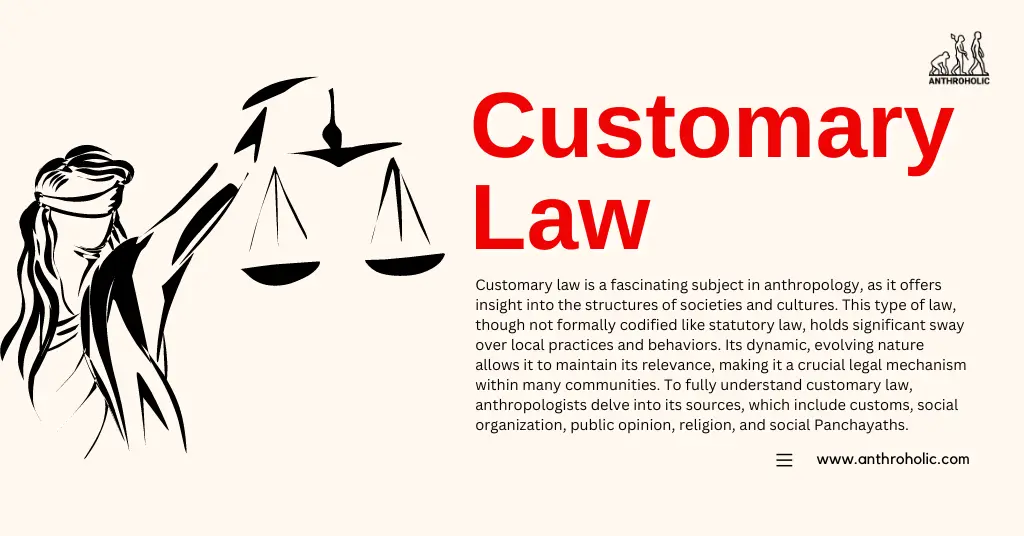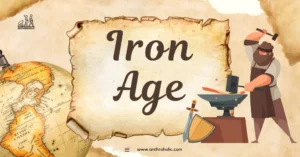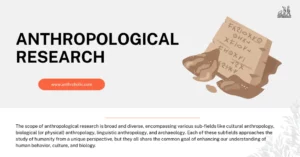AI Answer Evaluation Platform Live Now. Try Free Answer Evaluation Now
Customary Law
Customary law is a fascinating subject in anthropology, as it offers insight into the structures of societies and cultures. This type of law, though not formally codified like statutory law, holds significant sway over local practices and behaviors. Its dynamic, evolving nature allows it to maintain its relevance, making it a crucial legal mechanism within many communities. To fully understand customary law, anthropologists delve into its sources, which include customs, social organization, public opinion, religion, and social Panchayaths.

Sources of Customary Law
1. Customs
Customs are the foundation of customary law. These are widely accepted practices that have evolved over time within a community [1]. These customary laws might encompass a wide array of practices, from marriage rites to land ownership, dispute resolution, and more.
2. Social Organization
Social organization refers to the system of relationships and hierarchies within a society [2]. This system significantly influences the formation of customary law, as norms are often designed to maintain social order and cohesion.
3. Public Opinion
Customary law is also heavily influenced by public opinion. The collective sentiment of a community, forged by shared experiences and beliefs, can alter or reinforce certain customary laws [3].
4. Religion
Religion plays a crucial role in shaping customary laws in many societies. Religious beliefs and doctrines often provide the moral and ethical frameworks within which these laws operate [4].
5. Social Panchayath
Social Panchayaths, or local self-governing bodies, are critical in formalizing and enforcing customary law, particularly in South Asian societies. These bodies reflect the collective will of the community, maintaining social order and justice through the enforcement of local norms and customs [5].
Nature of Customary Law
Customary law has several unique characteristics that differentiate it from other legal systems:
- Flexibility: Unlike statutory law, customary law is inherently adaptable, allowing it to evolve with societal changes.
- Community-Oriented: Customary law is rooted in the practices, values, and norms of a specific community, making it highly context-specific.
- Informal Enforcement: Customary law is often enforced informally, through social pressure and community consensus, rather than through formal judicial processes.
- Prevalence: Despite its informal nature, customary law often holds a higher degree of acceptance and legitimacy within a community compared to statutory law.
| Characteristics | Description |
|---|---|
| Flexibility | Allows for evolution with societal changes |
| Community-Oriented | Rooted in specific community’s practices, values, and norms |
| Informal Enforcement | Enforced through social pressure and community consensus |
| Prevalence | Often holds higher legitimacy within a community compared to statutory law |
Practical Applications of Customary Law
In recent years, the relevance of customary law has been reaffirmed through its practical application in various fields:
1. Land Tenure and Management
Customary law often shapes land tenure systems, guiding the usage, ownership, and management of land in many communities. In Africa, customary land laws still regulate a significant proportion of land use.
2. Conflict Resolution
In many traditional societies, customary law offers an effective means of conflict resolution. Its processes are usually faster and more accessible than formal judicial processes, enhancing their appeal to community members.
3. Protection of Indigenous Rights
Customary law is increasingly recognized in international law for its role in safeguarding indigenous rights. It provides a framework for the recognition and protection of these communities’ traditional lands, resources, and cultural practices.
Challenges and Controversies of Customary Law
Despite its significance, customary law is not without controversy:
- Contradictions with Statutory Law: Some customary laws may contradict statutory or constitutional laws, leading to conflicts and legal ambiguities.
- Human Rights Concerns: Certain customary laws, particularly those regarding gender or social hierarchies, can raise human rights concerns. The enforcement of these laws may perpetuate discrimination and inequality.
- Codification Challenges: The flexible, context-specific nature of customary law can make its codification challenging, potentially leading to misinterpretation or distortion.
| Challenges | Description |
|---|---|
| Contradictions with Statutory Law | May lead to legal ambiguities |
| Human Rights Concerns | May perpetuate discrimination and inequality |
| Codification Challenges | Can lead to misinterpretation or distortion |
Conclusion
While customary law is an integral part of many communities, its practical applications and the challenges it poses highlight the complex nature of this legal mechanism. By understanding its origins, characteristics, and implications, we can better appreciate the role of customary law within societies. In an increasingly globalized world, it is crucial to respect and understand these laws’ significance, offering an avenue for harmonious integration of different legal traditions.
References
[1] Bicchieri, C. (2006). The grammar of society: The nature and dynamics of social norms.
[2] Durkheim, É. (2013). The division of labor in society.
[3] Tyler, T. R. (2006). Why people obey the law.
[4] Sullivan, W. F. (1988). The impossibility of religious freedom.
[5] Malik, Y. (1988). Panchayati Raj: From Legislation to Movement.




